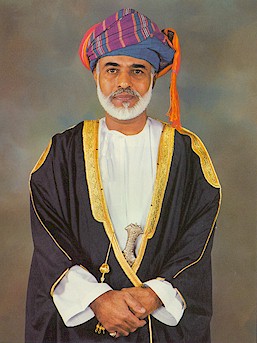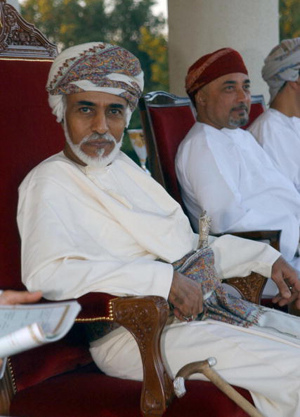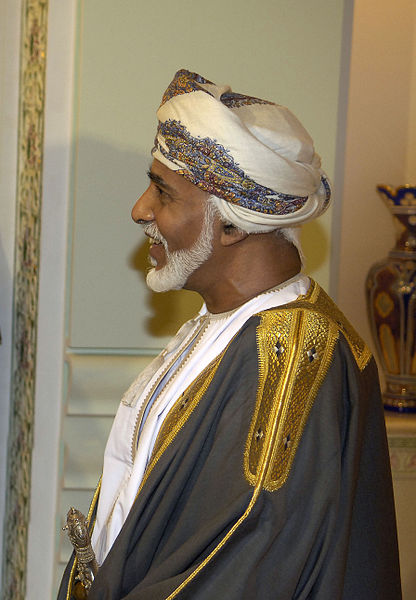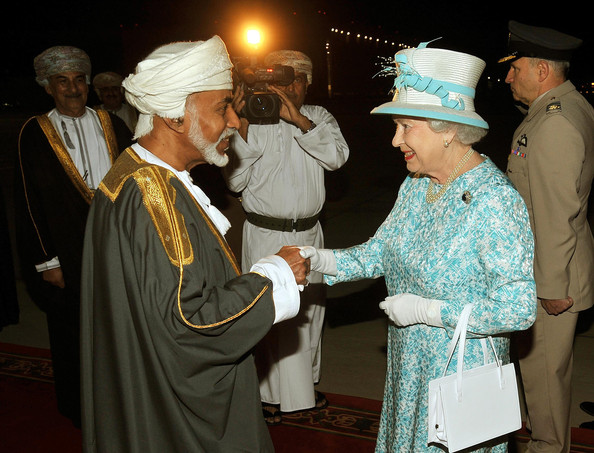<Back to Index>
- Sultan of Oman Qaboos bin Said Al Said, 1940
PAGE SPONSOR



Qaboos bin Said Al Said (Arabic: قابوس بن سعيد آل سعيد; born 18 November 1940) is the Sultan of Oman and its Dependencies. He rose to power after overthrowing his father, Said bin Taimur, in a palace coup in 1970. He is the 14th generation descendant of the founder of the Al Bu Sa'idi dynasty.
Sultan Qaboos bin Sa‘id was born in Salalah in Dhofar on 18 November 1940. He is the only son of Sultan Said bin Taimur and princess Mazoon al-Mashani. He received his primary and secondary education at Salalah and Pune [Maharashtra, India] and was sent to a private educational establishment in England at age sixteen. At 20 he entered the Royal Military Academy Sandhurst. After graduating from Sandhurst, he joined the British Army and was posted to the 1st Battalion The Cameronians (Scottish Rifles), serving in Germany for one year. He also held a staff appointment with the British Army.
After his military service, Sultan Qaboos studied local government subjects in England and, after a world tour, returned home to Salalah where he studied Islam and the history of his country. Sultan Qaboos ibn Sa‘id is a Muslim of the Ibadi school of jurisprudence, which has traditionally ruled Oman. A religious liberal, he has financed the construction or maintenance of a number of mosques, notably the Sultan Qaboos Grand Mosque, as well as the holy places of other religions.
In 1976 Qaboos bin Said married his cousin, Kamila, née Sayyidah Nawwal bint Tariq (born 1951), daughter of HH Sayyid Tariq ibn Taymur. However, the marriage soon ended in divorce and he has never remarried or had any children.
Qaboos bin Said is an avid fan and promoter of classical music. His 120 member orchestra has a high reputation in the Middle East. The orchestra consists entirely of young Omanis who, since 1986, audition as children and grow up as members of the symphonic ensemble. They play locally and travel abroad with the sultan. Argentine composer Lalo Schifrin was commissioned to compose a work entitled Symphonic Impressions of Oman and the Sultan is particularly enthusiastic about the pipe organ.
The Sultan's birthday, 18 November, is celebrated as Oman's national
holiday. The first day of his reign, 23 July, is celebrated as Renaissance Day.
For six years prior to Said bin-Taymur's overthrow, Qaboos experienced virtual house arrest in the Royal Palace of Salalah. In July 1970, soldiers supporting Qaboos clashed with forces loyal to Said bin-Taymur and deposed him. Qaboos maintains that his father abdicated the throne. The British government helped to consolidate Qaboos' power.
Qaboos acceded to the throne on 23 July 1970 after deposing his father in a palace coup with the aim of ending the country's isolation and using its oil revenue for modernization and development, moving to Muscat. There he declared that the country would no longer be known as Muscat and Oman, but would change its name to "the Sultanate of Oman" in order to better reflect its political unity.
The first pressing problem that Qaboos bin Said faced as Sultan was
an armed communist insurgency from South Yemen, the Dhofar Rebellion
(1965 – 1975). The Sultanate eventually defeated the incursion with
help
from the Shah of Iran, Jordanian troops sent from his friend King
Hussein of Jordan, British Special Forces and the Royal Air Force.
The political system which Qaboos established is that of an absolute monarchy. Unlike the situation in neighboring Saudi Arabia, Qaboos' decisions are not subject to modification by other members of Oman's royal family. Government decisions are said to be made through a process of decision making by "consensus" with provincial, local and tribal representatives, though critics allege that Qaboos exercises de facto control of this process. Qaboos also regularly engages in tours of his realm, in which any citizen with a grievance or request is allowed to appeal to the Sultan in person.
More recently, Qaboos has allowed parliamentary elections (in which women have voted and stood as candidates) and pledged greater openness and participation in government. The parliament enjoys legislative and oversight powers. In 1979 Oman was the only Arab state to recognize Egyptian President Anwar Sadat's peace agreement with Israel.
Qaboos' supporters point to his relative success in governing the country. By Gulf standards, Oman boasts good public order, middling prosperity, and a relatively permissive society. Since he acceded to the throne, Oman has broadened international relations, allowed newspapers, established high schools, built highways, opened hotels and shopping malls and spends a substantial portion of its dwindling oil revenues on health care and education.
In September 1995, he was involved in a car accident in Salalah just out side his palace, which claimed the life of one of his most prominent and influential ministers and his right hand man, Qais Bin Abdul Munaim Al Zawawi.
In October 1998, Qaboos bin Said was presented with the International
Peace Award by the National Council on US - Arab Relations. He also
forges and maintains good relations with other Arab states and partners
in the Gulf Cooperation Council (GCC).
Qaboos officially keeps Oman neutral, having contacts and normal relations with Iran while being an ally of western states like Britain and America. In talks with American officials released by wikileaks, Qaboos dodged requests by the Americans for Oman to invest in Iraq and Afghanistan, switching to other topics. Qaboos was against Americans withdrawing quickly from Iraq.
Oman has more normal relations with Iran than the other Gulf Arab states, careful to appear neutral and maintain a balance between the West and Iran.
Qaboos criticized the Arab Nationalist leader Gamal Abdel Nasser
in private discussions with American officials which were released by
Wikileaks. He claimed Nasser deliberately used inflammatory speeches and
rhetoric to make his people stupid, and accused Nasser of having "set
the region back", holding a position of "anti - everything". Qaboos
concluded that the Muslim Brotherhood obtained support from the uneducated people.
Unlike the heads of other Gulf Arab states, Qaboos bin Sa‘id has not publicly named an heir. Article 6 of the constitution actually provides that the Ruling Family Council chooses the successor after the throne becomes vacant, and that the Sultan's preference, to be expressed in an official letter (which Qaboos says has already been sealed and delivered to the defense minister), is only resorted to in the event of lack of familial consensus.
Qaboos bin Sa‘id has no children and has three sisters; there are
other male members of the Omani Royal Family including several paternal
uncles and their families. Using primogeniture the successor to Qaboos
would appear to be the children of his late uncle, His Royal Highness
Sayyid Tariq bin Taimur Al Said, the former, first and only Prime Minister in Oman's history.
